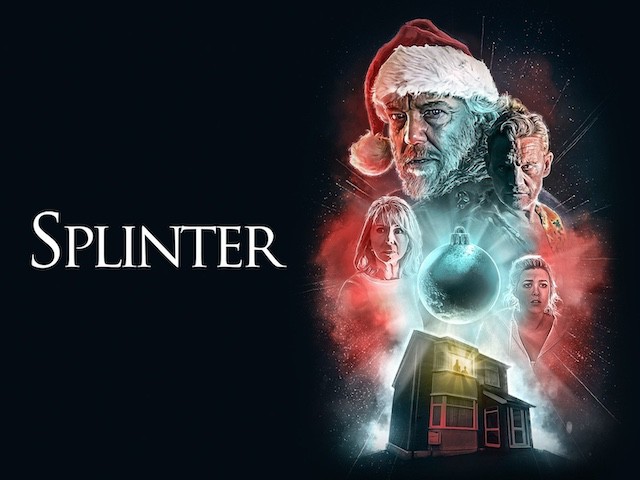Horror Movie Review: Splinter (2021)
Are you hoping for something jolly to watch this festive season? Something that embodies the most magical time of the year? A film that leaves you warm inside and with a smile on your face? If so, it’s probably best you don’t watch writer/director David Bryant’s Splinter.
However, if you’re after a dark tale based around depression and its effects, and don’t mind the slow-burn of a psychological horror, all with Christmas as a backdrop, then this great movie is worth a watch.

John (Bill Fellows) has suffered a tremendous loss, returning home at Christmas to find his wife and son dead, having been murdered by an intruder. He is devastated and six months later, has effectively stopped living. His home is frozen in time, all the Christmas decorations are still up, and he sleepwalks his way through daily mundane tasks, all while doing everything possible to avoid going outside.
Day by day, he sinks further into his depression, and its clear that John needs to find a way to move on. Something his psychiatrist (Jane Asher) is pushing for, encouraging him to open the curtains and continue to take his medication. However, John doesn’t want to, and in a fit of frustration and grief, throws all his pills away.

It doesn’t take a genius to work out that this was probably a bad idea, and that is proven as John’s dreams start to get quite intense, he loses big chunks of time, and certain items related to his family start to appear in mysterious places. It’s enough to drive a person crazy.
Splinter is a wonderful movie that deals with heavy subjects, taking its time with the characters, and ramping things up in an exciting, revelatory way. The majority of the movie is carried by Bill Fellows as John, and he is fantastic. Really portraying the daily grind of living without those you love, and unable to actually process what has happened. His character work is excellent and how it develops over the course of the movie is what makes Splinter so watchable.

Writer/director David Bryant has done a fantastic job on a very modest budget, even shooting the film in his own home, and that dedication pays off. Splinter doesn’t look or feel cheap, and that is testament to the good lighting and sound that makes the viewer feel like they’re also in the house.
Where the film does drop a little bit is when it starts to tackle deep mental health problems. Bryant tries to showcase this in a believable way, but doesn’t quite answer enough questions to really satisfy. Even still, plenty are given, and that a serious attempt to deal with a difficult subject and portray it realistically, is even attempted, is extremely admirable. There’s just enough twists and turns to Splinter to surprise even the most ardent of genre fans.

In today’s attention-lacking world, it’s easy to see that many would call Splinter boring, but that is doing it an injustice. It is a slow burn psychological horror, and you need to be willing to let it fester and grow. The demand for action doesn’t make any sense when it’s not that kind of movie at all. The horror comes from the experience of being with John in his home and watching his mind slowly unravel. That is always going to be ten times more frightening than any jump scare could ever be.
Splinter is a very good movie, even if it won’t leave you feeling full of cheer is Christmas.
Splinter (2021)
-
The Final Score - 7/10
7/10




